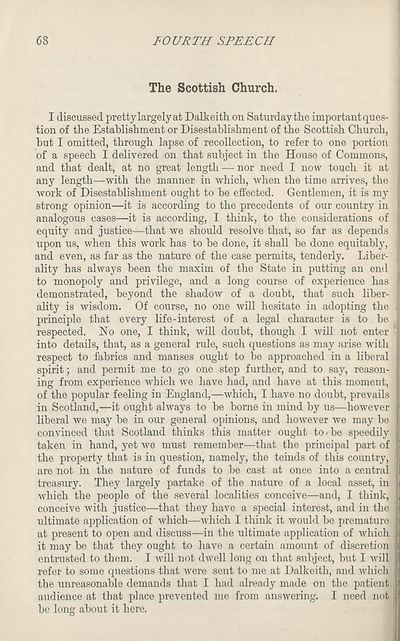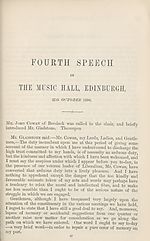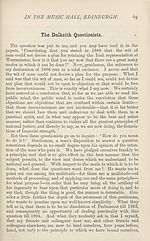Download files
Complete book:
Individual page:
Thumbnail gallery: Grid view | List view

68
FOURTH SPEECH
The Scottish Church.
I discussed pretty largelyat Dalkeith on Saturday the important ques¬
tion of the Establishment or Disestablishment of the Scottish Church,
but I omitted, through lapse of recollection, to refer to one portion
of a speech I delivered on that subject in the House of Commons,
and that dealt, at no great length — nor need I now touch it at
any length—with the manner in which, when the time arrives, the
work of Disestablishment ought to he effected. Gentlemen, it is my
strong opinion—it is according to the precedents of our country in
analogous cases—it is according, I think, to the considerations of
equity and justice—that we should resolve that, so far as depends
upon us, when this work has to be done, it shall be done equitably,
and even, as far as the nature of the case permits, tenderly. Liber¬
ality has always been the maxim of the State in putting an end
to monopoly and privilege, and a long course of experience has
demonstrated, beyond the shadow of a doubt, that such liber¬
ality is wisdom. Of course, no one will hesitate in adopting the
principle that every life-interest of a legal character is to be
respected. No one, I think, will doubt, though I will not enter
into details, that, as a general rule, such questions as may arise with
respect to fabrics and manses ought to be approached in a liberal
spirit; and permit me to go one step further, and to say, reason¬
ing from experience which we have had, and have at this moment,
of the popular feeling in England,—which, I have no doubt, prevails
in Scotland,—it ought always to be borne in mind by us—however
liberal we may be in our general opinions, and however we may be
convinced that Scotland thinks this matter ought to/be speedily
taken in hand, yet we must remember—that the principal part of
the property that is in question, namely, the teinds of this country,
are not in the nature of funds to be cast at once into a central
treasury. They largely partake of the nature of a local asset, in
which the people of the several localities conceive—and, I think,
conceive with justice—that they have a special interest, and in the
ultimate application of which—which I think it would be premature
at present to open and discuss—in the ultimate application of which,
it may be that they ought to have a certain amount of discretion
entrusted to them. I will not dwell long on that subject, but I will
refer to some questions that were sent to me at Dalkeith, and which
the unreasonable demands that I had already made on the patient
audience at that place prevented me from answering. I need not
be long about it here.
FOURTH SPEECH
The Scottish Church.
I discussed pretty largelyat Dalkeith on Saturday the important ques¬
tion of the Establishment or Disestablishment of the Scottish Church,
but I omitted, through lapse of recollection, to refer to one portion
of a speech I delivered on that subject in the House of Commons,
and that dealt, at no great length — nor need I now touch it at
any length—with the manner in which, when the time arrives, the
work of Disestablishment ought to he effected. Gentlemen, it is my
strong opinion—it is according to the precedents of our country in
analogous cases—it is according, I think, to the considerations of
equity and justice—that we should resolve that, so far as depends
upon us, when this work has to be done, it shall be done equitably,
and even, as far as the nature of the case permits, tenderly. Liber¬
ality has always been the maxim of the State in putting an end
to monopoly and privilege, and a long course of experience has
demonstrated, beyond the shadow of a doubt, that such liber¬
ality is wisdom. Of course, no one will hesitate in adopting the
principle that every life-interest of a legal character is to be
respected. No one, I think, will doubt, though I will not enter
into details, that, as a general rule, such questions as may arise with
respect to fabrics and manses ought to be approached in a liberal
spirit; and permit me to go one step further, and to say, reason¬
ing from experience which we have had, and have at this moment,
of the popular feeling in England,—which, I have no doubt, prevails
in Scotland,—it ought always to be borne in mind by us—however
liberal we may be in our general opinions, and however we may be
convinced that Scotland thinks this matter ought to/be speedily
taken in hand, yet we must remember—that the principal part of
the property that is in question, namely, the teinds of this country,
are not in the nature of funds to be cast at once into a central
treasury. They largely partake of the nature of a local asset, in
which the people of the several localities conceive—and, I think,
conceive with justice—that they have a special interest, and in the
ultimate application of which—which I think it would be premature
at present to open and discuss—in the ultimate application of which,
it may be that they ought to have a certain amount of discretion
entrusted to them. I will not dwell long on that subject, but I will
refer to some questions that were sent to me at Dalkeith, and which
the unreasonable demands that I had already made on the patient
audience at that place prevented me from answering. I need not
be long about it here.
Set display mode to:
![]() Universal Viewer |
Universal Viewer | ![]() Mirador |
Large image | Transcription
Mirador |
Large image | Transcription
| Antiquarian books of Scotland > Politics & government > Political speeches in Scotland in 1890 > (72) |
|---|
| Permanent URL | https://digital.nls.uk/126569154 |
|---|
| Description | Thousands of printed books from the Antiquarian Books of Scotland collection which dates from 1641 to the 1980s. The collection consists of 14,800 books which were published in Scotland or have a Scottish connection, e.g. through the author, printer or owner. Subjects covered include sport, education, diseases, adventure, occupations, Jacobites, politics and religion. Among the 29 languages represented are English, Gaelic, Italian, French, Russian and Swedish. |
|---|

